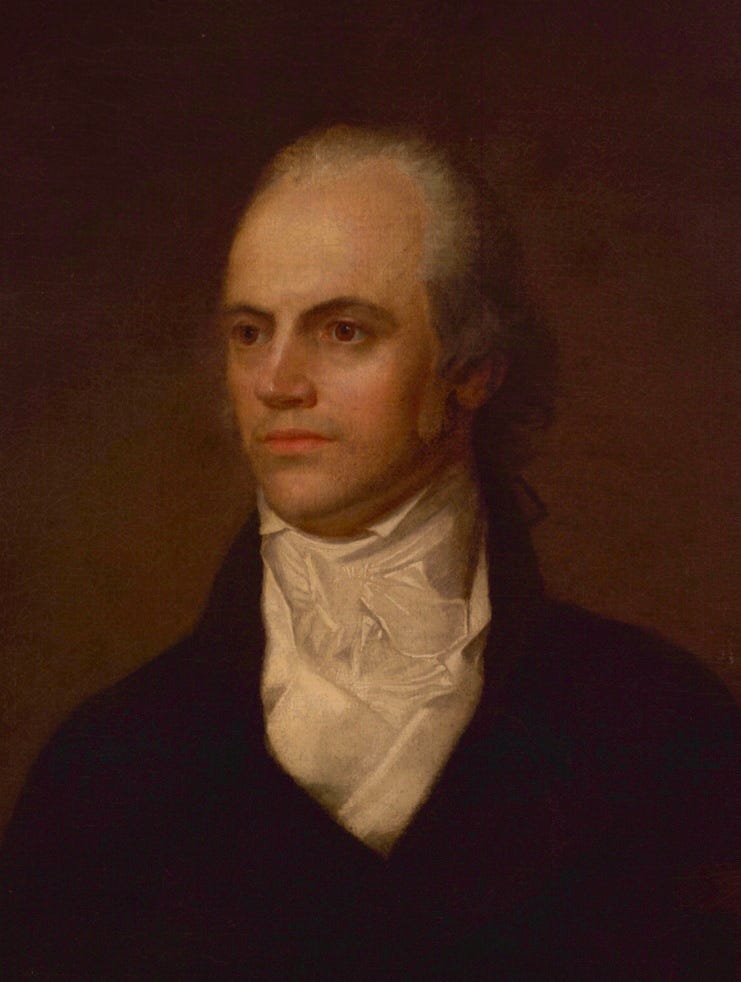The Constitution of the United States defines treason as: “Treason against the United States, shall consist only in levying War against them, or in adhering to their Enemies, giving them Aid and Comfort.”
To be clear, this applies only during a time of war, it is impossible to be considered treasonous during peacetime.
English common law’s definition of treason was more expansive and included “disloyal and subversive thoughts”, essentially anything contrary to the King’s desires. This was often used to confiscate the property of those accused (and convicted), and thus was a political weapon.
This was tested fairly early in the history of the USA in a trial against former vice president Aaron Burr in 1807. The court recognized that Aaron Burr was a clear political enemy of president Thomas Jefferson, and that Jefferson’s animosity toward Burr was not justification to consider Burr to be committing treason.
Assembling an armed force was ruled to not meet the stricter American definition of treason.
A very fundamental and critically important feature of the Constitution is that it protects even those who would be considered enemies.
Charges of treason have been very rare, only having been brought less than thirty times since the Constitution went into effect in 1789.
Aaron Burr is a rather intriguing and despicable character in our history. People of the time called him “the greatest villain on earth”. Burr served in the Continental Army, moved to New York City and became a lawyer. He clashed with Alexander Hamilton over the confiscation of property of the Tory loyalists. Burr had no qualms of buying confiscated property at low prices and then re-selling it for a profit.
Burr became a senator (with the political help of George Clinton) and in 1800 was picked to run as vice president with Jefferson. But Jefferson and Burr both won 73 electoral votes and thus Burr almost ended up as president instead of Jefferson. Over the course of Jefferson’s first term a significant amount of animosity developed between Jefferson and Burr. Denied the position of vice president again, Burr ran for governor of New York in 1804. He lost and blamed Alexander Hamilton for his loss.
Burr challenged Hamilton to a duel. Being a gentleman Hamilton fired into the air, but Burr took aim, shot and killed Hamilton. (of course Hamilton was one of the most influential creators of the Constitution)
Burr was denounced as an assassin but slipped out of New York before he could be arrested. Keep in mind Burr was the “lame duck” vice president at the time and had the impudence to show up in Washington to give a farewell speech. He then set off west and eventually ended up in New Orleans.
Still as vice president he began negotiations with the British to help them seize the western part of the USA. Amazingly he also was negotiating with the Spanish to do the same thing! He assembled 4,000 to 5,000 volunteers and established an armed base on Blennerhassett Island in the middle of the Ohio River. Apparently to recruit these volunteers he was spreading the lie that Jefferson had commissioned him to lead a force to conquer Mexico.
Burr was eventually arrested but the Constitution protected him as not actually guilty of treason. The jury only deliberated for a few minutes before finding Burr not guilty of treason.
What lessons can we draw from all this scandal?
Clearly, even in the founding father’s time, politicians had strong rivalries, conflicting views and sometimes despicable behavior.
Perhaps the most important lesson though is the concept that Americans may oppose our own government and not be traitors – even when the current President pronounces someone as “guilty of treason”. Our history has a strong foundation of protecting those who disagree with the government.



Very interesting! Thanks for posting this.